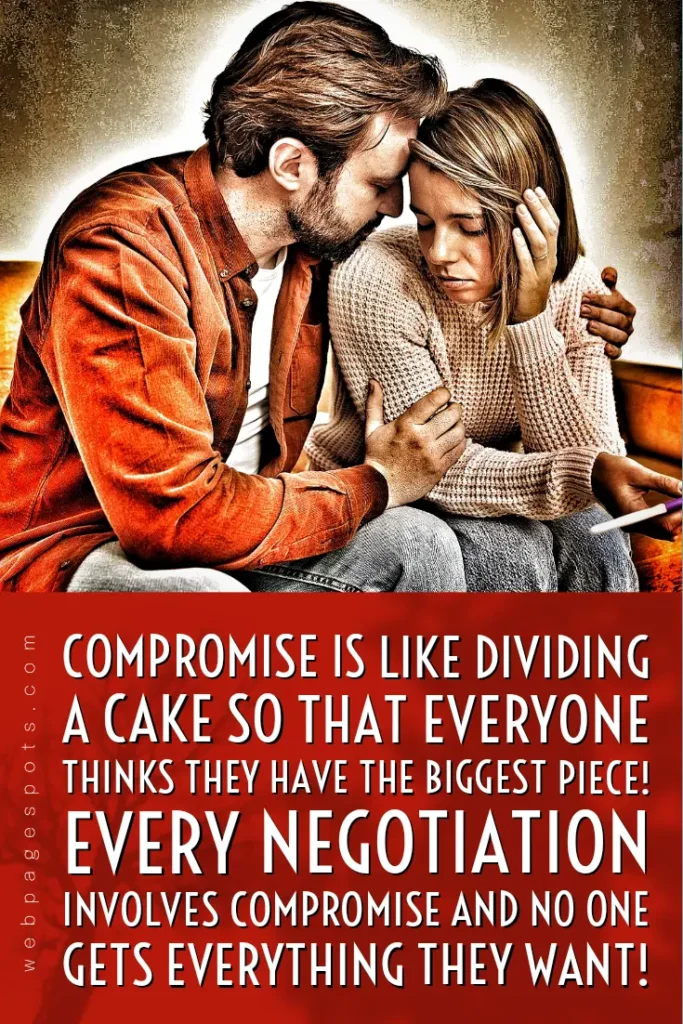When 2 worlds collide: the power of compromise in relationships!
This blog post may contain affiliate links. If we find a product or service to be useful, we encourage you to visit the website via that link. If you make a purchase through our referral link, we may receive a commission. Rest assured, you will not be charged any additional fees. By using these links, you can support us while making your purchase. For more information visit here.
A compromise is a decision-making process where two or more parties make concessions to arrive at a win-win solution. It involves negotiating and finding a settlement that satisfies all sides. Reaching an acceptable decision may require innovative thinking and a willingness to let go of some demands.
Let’s shed more light on aspects related to compromise in relationships!
I. Compromise in Relationships!
You can’t overstate the importance of compromise in relationships. Healthy relationships require compromise, whether between romantic partners, friends, or family members. It’s critical to realize that compromise does not mean sacrificing your desires or ideals. Instead, the focus should be on reaching a consensus that benefits all.
Another critical factor is how often compromise occurs. If one person consistently gives in, anger and imbalance can develop. Regular compromise helps both partners feel heard and valued, which promotes a stronger and more satisfying relationship. Let’s explore the power of compromise in relationships.
A. Defining compromise in relationships!
Any relationship requires compromise. It entails reaching a middle ground that all sides accept, even if it involves giving up something. It is imperative that both parties are ready to hear, comprehend, and strive toward a resolution that serves both parties’ interests.
B. The Six-Step Process to Compromise
Arguments happen, but they don’t mean the end of the world! This will help you get along and keep everyone happy.
- Figure out what you want. Just think about what’s important to you right now. What won’t you give in on?
- Pay attention! Listen to what your partner has to say, and then quietly and clearly say what you think.
- Look for the overlap. Come up with ideas for answers together. What would make both of you happy?
- Prepare to bend. To get some, you’ve to give some. For the sake of friendship, be ready to change your mind a little.
- Follow this plan: Once you reach a deal, make sure you stick to it. Keep each other up-to-date!
- Do you need help? To get out of a tough spot, a therapist or counselor can be very helpful.
Remember that there are two sides to every agreement. It’s not okay to always feel like you’re losing. Be true to who you are, but be willing to find answers that work for everyone. Compromise can help you keep your relationship happy if you talk about it, are patient, and use it often.
II. The Power of Compromise in Relationships!
Making concessions in a relationship cultivates mutual esteem, cognizance, and assurance. It makes the environment happy and wholesome by enabling both people to feel heard and respected. Apart from that, it promotes conflict resolution and strengthens relationships between partners.

A. 9 Aspects of the Power of Compromise in Relationships
In any relationship, teamwork makes the dream work! Want to know why compromise is the secret weapon for happy couples? Here are 9 reasons: It allows for shared decision-making, reduces conflicts, and creates a sense of equality in the relationship.
1. Find the Happy Medium
Finding the ideal temperature is like finding a middle ground that is neither too hot nor too cold for each person. It makes everyone feel good!
2. Keeps the peace
Nobody likes constant fights. If you often compromise, you can avoid fights and find solutions that work for both of you.
3. It shows that you care.
When you make compromises, it will prove to your partner that you care about their feelings and wants. It makes the link stronger.
4. Win-win solutions
Two people can agree on something without one person always giving in. It’s about giving everyone what they want to make everyone happy.
5. It helps with creativity.
Putting together different ideas can lead to the best answers! Sometimes, coming to an agreement can lead to better ideas than the ones you had before.
6. It teaches you to be open-minded.
Compromise helps you see things from your partner’s point of view. You become more tolerant and willing to listen to other points of view.
7. It makes things fair.
No one should always get what they want. Giving and taking help keep your relationship fair and balanced.
8. It helps you solve problems.
The more you give in, the better you get at finding answers that work for everyone. This is a useful skill for all kinds of dates!
9. Relationships that last
Relationships that require giving and taking are more likely to last longer. You all work together to make everyone happy.
B. Finding common ground in love means compromising!
Exchange and agreement are at the heart of relationships. It can feel like you want two different things, even for small things like dinner (Italian or Mexican?) or movie night (action or romance?). That’s where giving in comes in—compromise.
Find a middle ground to show that you care about what your partner likes.
But giving in isn’t just about what’s on the pizza. Things like where to live, money, and even having kids can be hard to decide.
It’s important to talk things over and find answers that work for both of you. It may not always be easy, but it shows that you work together to make a happy future.
Being with someone doesn’t mean you’re the same person. You might need time alone to recover, while your partner loves being with other people. Giving in can help you find balance.
You can have fun together, but make sure you each have time for yourself to feel your best. It is important to treat each other with care and make room for both of you in the relationship.
III. Communication is the foundation of compromise.
The key to a lasting and fulfilling relationship is finding common ground, and that’s where compromise comes in. But navigating those compromises can be tricky. Strong communication skills are the secret weapon for both understanding your partner’s needs and reaching mutually beneficial solutions.
During negotiations and conflict resolution, think of communication as the bridge that allows you to connect and truly hear each other.
Why is communication so crucial?
Effective communication allows for consideration of both perspectives and respectful resolution of debates, which helps to cultivate a strong partnership.
Without open and honest dialogue, misunderstandings can easily arise, breeding resentment, frustration, and even the potential for a broken relationship. Understanding the importance of communication in compromise isn’t just a relationship skill; it’s the foundation for building and maintaining healthy, satisfying connections that thrive in all seasons.
Let’s take a quick look:
A. Importance of communication
Communication is the key to a successful relationship. It involves sharing thoughts, feelings, and concerns to avoid misunderstandings and resolve issues.
B. Communication barriers
Communication barriers can include language differences, cultural differences, and personal biases. These can create misunderstandings and prevent effective communication from occurring.
C. Overcoming communication barriers
Overcoming communication barriers involves being open-minded, actively listening, and practicing empathy. It is imperative to recognize and address communication barriers in a relationship.
IV. Identifying the need for compromise
Compromise in relationships isn’t just about finding middle ground or making a deal; it’s about understanding each other’s needs. A successful relationship requires both partners to recognize and accept each other’s differences and unique perspectives.
Here are some ways to recognize the need for compromise in a relationship:
A. Realizing the importance of each other’s needs
It’s imperative to acknowledge and understand each other’s needs in a relationship. You and your partner may have different priorities and values, but it’s essential to respect each other’s opinions and work together. Take the time to listen to your partner’s concerns and express your own.
B. Understanding each other’s perspective
Empathy is crucial in any relationship, and it’s essential to see things from your partner’s point of view. Understanding your partner’s perspective can help you find a compromise that works for both of you. Try to put yourself in your partner’s shoes and imagine how he or she might feel.
C. The importance of empathy in relationships
Empathy is the ability to understand and share another person’s feelings. It’s essential in any relationship because it helps build trust and an emotional connection. When you show empathy to your partner, you’re letting them know you care about their feelings and that you will work together to find a solution.

V. Steps to compromise in relationships
Any relationship that involves compromise must have both parties cooperate to find common ground. Successful compromise requires several steps, including active listening, comprehension of one another’s needs, and being prepared to make concessions.
It also fosters a commitment to finding win-win solutions and a willingness to let go of the urge to be right. In the end, developing strong and healthy relationships built on mutual respect, trust, and understanding requires compromise. Here are some steps to compromise.
1. Identifying the Problem
Recognizing the problem is the first step in making compromises. Prior to discussing a problem with your partner, it’s crucial to identify it. This helps both parties envision the issues that require attention.
2. Find common ground
Finding common ground is the next step after identifying the problem. It is critical to identify areas where both partners can agree and build a solution from there. Finding common ground can also help both partners better understand each other’s perspectives.
3. Brainstorm solutions
The third step in the compromise process is to brainstorm solutions. Both partners share their ideas and thoughts about solving the problem. Brainstorming helps find more creative solutions that work for both partners.
4. Select the appropriate solution
Once they have brainstormed all the solutions, the next step is to choose the right one. It should be a solution that both partners agree on and that meets their needs. It is imperative to ensure that the chosen solution is fair and balanced for both partners.
5. Implement the solution
The fifth step is to put the chosen solution into practice. Both partners should implement the agreed-upon solution. This can help show the partner’s commitment to the long-term relationship.
6. Revisiting the compromise
The last step in the compromise process involves verifying the agreement. This includes confirming if the solution works as expected and identifying any required adjustments.
Reviewing the compromise enables partners to ensure they still agree with the solution they’ve reached. It also helps ensure it continues to meet the needs of both parties until the next refinement.

Let’s take a look at compromise versus sacrifice in relationships—a confusing aspect.
VI. Compromise vs. Sacrificing in Relationships
The difference between compromise and sacrifice!
Although compromise and sacrifice may seem similar, they are different in relationships. In one instance, both sides cooperated to find a win-win resolution. In the second case, each party must contribute significantly. It’s imperative to understand these differences to maintain healthy and fair relationships based on respect and understanding.
| Compromise | Sacrifice |
| Mutual give-and-take | One-sided giving |
| Respects of both partners’ needs | Disregards one partner’s needs |
| Make temporary adjustments. | Permanent loss |
People often confuse compromise and sacrifice, but they are not interchangeable. Sacrifice is giving up something meaningful to you to help someone else. Finding a middle ground that suits both of you is what compromise entails.
In a relationship, sacrifice can be difficult because it may lead to resentment if one partner feels they are always sacrificing for the other. Contrarily, when both sides reach a compromise, they feel heard and respected.
Self-care is the key to relationships.
Every relationship relies on you and your spouse looking after one another. This entails establishing boundaries, taking care of oneself, and attending to your own needs. When you put your own needs first, you can better support your spouse and make concessions when called for. Ignoring your needs can lead to resentment and exhaustion. Both harm the relationship.
VII. The Consequences of Not Compromising
Couples who are unaware of the power of compromise risk developing a power dynamic in which one partner’s demands and desires regularly take precedence over the other. When this happens, they can’t negotiate in their relationship. This can lead to anger and hostility that undermine the foundation of understanding and trust necessary for a healthy partnership. Ultimately, the refusal to compromise can destroy a partnership. This can leave both parties disappointed and unhappy.
A. Negative impact on the relationship
When one or both parties in a relationship refuse to compromise, it can negatively impact the relationship. This can lead to resentment, frustration, and ultimately a relationship breakdown.
Both sides must be prepared to listen to one another and make concessions when required for a relationship to flourish.
B. Lack of relationship growth
When one or both parties refuse to compromise, relationship stagnation can also occur. Without compromise, the relationship can become stagnant and repetitive, leading to boredom and a lack of excitement. Making compromises can help keep the relationship fresh and exciting, and allow both parties to grow and learn together.
C. The possibility of losing the relationship
Ultimately, losing a relationship can result from a lack of compromise. It’s challenging to resolve a tense and conflictual atmosphere when one or both sides refuse to listen to each other or make concessions. Both partners must make compromises when necessary to keep their relationship strong and joyful.

VIII. In relationships, who should compromise first, the man or the woman?
In a relationship, it is not always clear who should negotiate first—the man or the woman. There is no hard-and-fast rule about who makes the first compromise. Every relationship is unique. In order for a relationship to succeed, both partners need to compromise. Depending on the situation, both men and women can choose.
It’s unhealthy and out of date to think that an individual should have more power in a partnership. It is unfair to place responsibility solely on one partner, as it takes teamwork and effort from both individuals to make a relationship work.
A relationship is a partnership, and it takes both people to make it successful. Compromising means understanding each other’s needs and finding common ground. Rather than focusing on gender roles, both partners should come to an agreement that works for them.
Remember, negotiation has two sides. It is about respecting and understanding one another, not about gender roles or assumptions. Compromise in any relationship should never be one-sided and always be a team effort to establish a solid foundation. Finding a solution that deepens the relationship between the spouses is ultimately more vital than determining who compromises first.
IX. Final thoughts
Compromise is an effective strategy that enhances bonds and promotes mutual understanding between parties. Finding common ground and being prepared to listen and comprehend is necessary. Couples may learn to compromise in order to get past their differences and strive for a shared future.
Prioritizing compromise and communication is essential to maintaining a successful relationship. Both partners can work together to create a solid and lasting relationship by listening to each other, offering compromise when necessary, and putting self-care first.
Never forget that reaching a compromise does not mean leaving your principles or convictions. Being honest and open with your partner will help you learn to compromise. You should also be willing to give in when necessary. You’ll discover that compromise will help you build a more satisfying relationship with time and practice.
Compromise fosters teamwork and cooperation by making both parties feel valued. Without compromise, relationships can become stagnant and repetitive, leading to frustration and eventual dissolution. Thank you for taking the time to understand the power of compromise in relationships.
X. FAQs
-
Why is compromise a necessity in a relationship?
In a relationship, compromise is necessary to meet the expectations of both parties. It requires a willingness to find a middle ground and work together to achieve a solution that meets both partners’ needs. It creates a sense of teamwork and cooperation.
-
What if a compromise is not possible in a relationship?
If compromise is not possible in a relationship, it may be time to reevaluate the relationship. If one partner is consistently unwilling to compromise, it may be a sign of deeper issues in the relationship that need to be addressed.
-
Can too much compromise damage a relationship?
Yes, too much compromise can be a problem in a relationship. It is imperative to balance compromise and self-care to ensure that both partners get what they want and that the relationship remains healthy.
-
How do you compromise without losing yourself in a relationship?
Compromising without losing yourself in a relationship requires effective communication, self-awareness, and a willingness to prioritize your own needs while considering the needs of the relationship.
-
How does compromise improve a relationship?
Compromise can improve a relationship by fostering trust, mutual respect, and a sense of partnership. It can also lead to greater intimacy, deeper understanding, and a stronger bond between partners.
-
What is the difference between compromise and sacrifice in a relationship?
Sacrifice involves giving up something important to you for someone else, whereas compromise involves finding a middle ground that benefits both parties.
Understanding the importance of copyright law is absolutely vital, as it strictly prohibits any reproduction or replication of works without the explicit permission of the author. Any unauthorized duplication of content will lead to legal action for copyright infringement under Section 14 of the Copyright Act.











